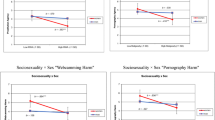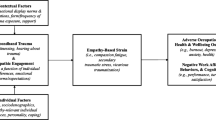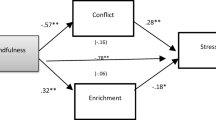Abstract
Little is known about the causal effect of sexual harassment policies on sexual harassment outcomes at work. Based on schema theories of social cognition, organizational policies related to sexual harassment should have a greater impact on responses to moderate, versus severe, forms of sexual harassment. In Study 1, 219 undergraduate students were shown a fictitious company website describing one of three company policies on sexual harassment (a zero-tolerance policy, a standard harassment policy, or no policy), and were then assigned to read about a moderate or severe instance of sexual harassment they ostensibly observed at the organization. Results indicated participants in the zero-tolerance policy condition were more likely to intend to formally report the harassment to their organization than those in the other conditions. This effect was especially strong for the moderate, or more ambiguous, sexual harassment scenario. Study 2 replicated and extended Study 1 using 101 Human Resources professionals and actual policy statements from an organization. Results again indicated that a zero-tolerance policy leads to the highest estimates of bystander reporting, especially for instances of moderate sexual harassment. Implications for practice include a caution against using minimal or compulsory harassment policies in place of salient zero-tolerance policies.


Similar content being viewed by others
Notes
The pretest data for Study 1 is available upon request from the first author.
References
Anton, C. M. (2015). The effects of persuasive communication on knowledge and attitudinal outcomes of a sexual harassment training program. Social Psychology, 16, 117–128.
Association of Women for Action and Research (AWARE) (2008). Research study on workplace sexual harassment 2008. Retrieved from http://aware.org.sg/wpcontent/uploads/AWARE_Research_Study_on_Workplace_Sexual_Harassment.pdf.
Bastian, L. D., Lancaster, A. R., Reyest, H. E., & United States. (1996). Department of Defense 1995 sexual harassment survey (DMDC report no. 96–014). Arlington: Defense Manpower Data Center.
Bem, S. L. (1981). Gender schema theory: a cognitive account of sex typing. Psychological Review, 88(4), 354–364. https://doi.org/10.1037/0033-295X.88.4.354.
Benavides-Espinoza, C., & Cunningham, G. B. (2010). Bystanders’ reactions to sexual harassment. Sex Roles, 63(3-4), 201–213. https://doi.org/10.1007/s11199-010-9781-7.
Berdahl, J. L., & Aquino, K. (2009). Sexual behavior at work: fun or folly? Journal of Applied Psychology, 94(1), 34–47. https://doi.org/10.1037/a0012981.
Berdahl, J. L., & Raver, J. L. (2011). Sexual harassment. In S. Zedeck (Ed.), Handbook of industrial and organizational psychology (Vol. 3) (pp. 641–669). Washington, DC: American Psychological Association.
Berkley, R. A., & Kaplan, D. M. (2009). Assessing liability for sexual harassment: reactions of potential jurors to email versus face-to-face incidents. Employee Responsibilities and Rights Journal, 21(3), 195–211. https://doi.org/10.1007/s10672-009-9110-x.
Bernadette van Rijn, M., Yang, H., & Sanders, K. (2013). Understanding employees’ informal workplace learning: the joint influence of career motivation and self-construal. Career Development International, 18(6), 610–628. https://doi.org/10.1108/CDI-12-2012-0124.
Blakely, G. L., Blakely, E. H., & Moorman, R. H. (1995). The relationship between gender, personal experience, and perceptions of sexual harassment in the workplace. Employee Responsibilities and Rights Journal, 8(4), 263–274. https://doi.org/10.1007/BF02623732.
Bodenhausen, G. V. (1992). Information-processing functions of generic knowledge structures and their role in context effects in social judgment. In N. Schwarz & S. Sudman (Eds.), Context effects in social and psychological research. New York: Springer-Verlag. https://doi.org/10.1007/978-1-4612-2848-6_18.
Bodenhausen, G. V., Macrae, C. N., & Hugenberg, K. (2003). Social cognition. In I. Weiner (Ed.), Handbook of psychology (Vol. 5) (pp. 257–282). Hoboken: Wiley. https://doi.org/10.1002/0471264385.wei0511.
Boyd, C. (2010). The debate over the prohibition of romance in the workplace. Journal of Business Ethics, 97(2), 325–338. https://doi.org/10.1007/s10551-010-0512-3.
Bruner, J. S. (1957). On perceptual readiness. Psychological Review, 64(2), 123–152. https://doi.org/10.1037/h0043805.
Buchanan, N. T., Settles, I. H., Hall, A. T., & O'Connor, R. C. (2014). A review of organizational strategies for reducing sexual harassment: insights from the US military. Journal of Social Issues, 70(4), 687–702. https://doi.org/10.1111/josi.12086.
Carli, L. L. (2004). Gender effects on social influence. In J. S. Seiter & R. H. Gass (Eds.), Perspectives on persuasion, social influence, and compliance gaining (pp. 133–148). Boston: Allyn & Bacon.
Charney, D. A., & Russell, R. C. (1994). An overview of sexual harassment. The American Journal of Psychiatry, 151(1), 10–17.
Cortina, L.M., Kabat-Farr, D., Leskinen, E.A.,Huerta, M., Magley, V.J. (2011). Selective incivility as modern discrimination in organizations: evidence and impact. Journal of Management, 39(6), 1579-1605.
Cortina, L. M., Kabat-Farr, D., Leskinen, E. A., Huerta, M., & Magley, V. J. (2013). Selective incivility as modern discrimination in organizations: evidence and impact. Journal of Management, 39(6), 1579–1605. https://doi.org/10.1177/0149206311418835.
Dougherty, T. W., Turban, D. B., Olson, D. E., Dwyer, P. D., & Lapreze, M. W. (1996). Factors affecting perceptions of workplace sexual harassment. Journal of Organizational Behavior, 17(5), 489–501. https://doi.org/10.1002/(SICI)1099-1379(199609)17:5<489::AID-JOB780>3.0.CO;2-6.
Eagly, A. H., & Carli, L. L. (2007). Through the labyrinth: The truth about how women become leaders. Cambridge: Harvard Business School Press.
Equal Employment Opportunity Commission. (1980). Guidelines on discrimination because of sex (Sect. 1604.11). Federal Register, 45, 74676–74677.
Equal Employment Opportunity Commission (1990). Employment guidance: vicarious employment liability for unlawful harassment. (Sect. 915.0E48) Federal Register, https://www.eeoc.gov/policy/docs/sexualfavor.html.
Equal Employment Opportunity Commission (2015). Charges alleging sexual harassment FY 2010 - FY 2015. Retrieved from https://www.eeoc.gov/eeoc/statistics/enforcement/sexual_harassment_new.cfm.
Firestone, J., Hackett, J. D., & Harris, R. J. (2012). Testing relationships between sex of respondent, sexual harassment and intentions to reenlist in the U.S. military. Public Administration Research, 1, 1–13.
Fitzgerald, L. F., & Ormerod, A. J. (1991). Perceptions of sexual harassment: the influence of gender and academic context. Psychology of Women Quarterly, 15(2), 281–294. https://doi.org/10.1111/j.1471-6402.1991.tb00797.x.
Fitzgerald, L. F., Swan, S., & Magley, V. J. (1997). But was it really sexual harassment? Legal, behavioral, and psychological definitions of the workplace victimization of women. In W. O'Donohue (Ed.), Sexual harassment theory, research, and treatment. New York: Allyn and Bacon.
Gelfand, M. J., Fitzgerald, L. F., & Drasgow, F. (1995). The structure of sexual harassment: a confirmatory analysis across cultures and settings. Journal of Vocational Behavior, 47(2), 164–177. https://doi.org/10.1006/jvbe.1995.1033.
Gettman, H., & Gelfand, M. J. (2007). When the customer shouldn’t be king: antecedents and consequences of customer sexual harassment. Journal of Applied Psychology, 92(3), 757–770. https://doi.org/10.1037/0021-9010.92.3.757.
Gruber, J. E. (1992). A typology of personal and environment sexual harassment: research and policy implications for the 1990s. Sex Roles, 26(11–12), 447–464. https://doi.org/10.1007/BF00289868.
Gruber, J. E. (1998). The impact of male work environments and organizational policies on women's experiences of sexual harassment. Gender and Society, 12(3), 301–320. https://doi.org/10.1177/0891243298012003004.
Gutek, B. A. (1995). How subjective is sexual harassment? An examination of rater effects. Basic and Applied Social Psychology, 17(4), 447-467.
Hames, D. S. (1994). Disciplining sexual harassers: What’s fair?. Employee Responsibilities and Rights Journal, 7(3), 207-217.
Holland, K. J., & Cortina, L. M. (2016). Sexual harassment: Undermining the wellbeing of working women. In Handbook on well-being of working women (pp. 83-101). Netherlands: Springer. https://doi.org/10.1007/978-94-017-9897-6_6.
Hulin, C., Fitzgerald, L., & Drasgow, F. (1996). Organizational influences on sexual harassment. In M. S. Stockdale (Ed.), Women and work: A research and policy series, volume 5: Sexual harassment in the workplace: Perspectives, frontiers, and response strategies (pp. 127–150). Thousand Oaks: SAGE Publications Ltd..
Ilies, R., Hauserman, N., Schwochau, S., & Stibal, J. (2003). Reported incidence rates of work-related sexual harassment in the United States: using meta-analysis to explain reported rate disparities. Personnel Psychology, 56(3), 607–631. https://doi.org/10.1111/j.1744-6570.2003.tb00752.x.
Kabat-Farr, D., & Cortina, L. M. (2014). Sex-based harassment in employment: new insights into gender and context. Law and Human Behavior, 38(1), 58–72. https://doi.org/10.1037/lhb0000045.
Kaser, J., George, B., & LaBella, A. (1995). Honoring boundaries: preventing sexual harassment in the workplace. Amherst: Human Resource Development Press.
Keenan, J. P. (2002). Whistleblowing: a study of managerial differences. Employee Responsibilities and Rights Journal, 14(1), 17–32. https://doi.org/10.1023/A:1015796528233.
Keenan, J. P., & McLain, D. A. (1992). Whistleblowing: a conceptualization and model. In Wall, J. L., & Jauch, K. R. (Eds.), Academy of Management Best Papers Proceedings (pp. 350–352). Las Vegas, NV.
Keyton, J., Ferguson, P., & Rhodes, S. C. (2001). Cultural indicators of sexual harassment. Southern Communication Journal, 67(1), 33–50. https://doi.org/10.1080/10417940109373217.
King, G. (1999). The implications of an organization’s structure on whistleblowing. Journal of Business Ethics, 20(2), 315–326.
Leskinen, E. A., Cortina, L. M., & Kabat, D. B. (2011). Gender harassment: broadening our understanding of sex-based harassment at work. Law and Human Behavior, 35(1), 25–39. https://doi.org/10.1007/s10979-010-9241-5.
Linenberger, P. (1983). What behavior constitutes sexual harassment? Labor Law Journal, 4, 238–247.
Lott, B., Reilly, M. E., & Howard, D. R. (1982). Sexual assault and harassment: a campus community case study. Signs: Journal of Women in Culture and Society, 8(2), 296–319. https://doi.org/10.1086/493964.
Macrae, C. N., & Quadflieg, S. (2010). Perceiving people. Handbook of social psychology, 1(5) (pp. 428–463). Hoboken: Wiley.
Magley, V. J., & Shupe, E. I. (2005). Self-labeling sexual harassment. Sex Roles, 53(3–4), 173–189. https://doi.org/10.1007/s11199-005-5677-3.
Marshall, A. M. (2017). Confronting sexual harassment: the law and politics of everyday life. New York, NY:Routledge.
McCabe, M. P., & Hardman, L. (2005). Attitudes and perceptions of workers to sexual harassment. The Journal of Social Psychology, 145(6), 719–740. https://doi.org/10.3200/SOCP.145.6.719-740.
McLaughlin, H., Uggen, C., & Blackstone, A. (2012). Sexual harassment, workplace authority and the paradox of power. American Sociological Review, 77(4), 625–647. https://doi.org/10.1177/0003122412451728.
Mesmer-Magnus, J. R., Viswesvaran, C. (2005). Whistleblowing in organizations: An examination of correlates of whistleblowing intentions, actions, and retaliation. Journal of Business Ethics, 62(3), 277-297.
Miceli, M. P., & Near, J. P. (1992). Blowing the whistle: The organizational and legal implications for companies and employees. New York: Lexington Books.
Miceli, M. P., Rehg, M., Near, J. P., & Ryan, K. C. (1999). Can laws protect whistle-blowers? Results of a naturally occurring field experiment. Work and Occupations, 26(1), 129–151. https://doi.org/10.1177/0730888499026001007.
Miner-Rubino, K., & Cortina, L. (2004). Working in a context of hostility towards women: implications for employee’s well-being. Journal of Occupational Health Psychology, 9(2), 107–122. https://doi.org/10.1037/1076-8998.9.2.107.
Near, J. P., & Miceli, M. P. (1990). When whistleblowing succeeds: Predictors of effective whistle-blowing. Paper Presented at the Annual Meeting of the Academy of Management, San Francisco.
Offermann, L. R., & Malamut, A. B. (2002). When leaders harass: the impact of target perceptions of organizational leadership and climate on harassment reporting and outcomes. Journal of Applied Psychology, 87(5), 885–893. https://doi.org/10.1037/0021-9010.87.5.885.
Osman, S. L. (2007). The continuation of perpetrator behaviors that influence perceptions of sexual harassment. Sex Roles, 56(1–2), 63–69. https://doi.org/10.1007/s11199-006-9149-1.
Parkes, C., & Davis, A. J. (2013). Ethics and social responsibility–do HR professionals have the ‘courage to challenge’ or are they set to be permanent ‘bystanders?’. International Journal of Human Resource Management, 24(12), 2411–2434. https://doi.org/10.1080/09585192.2013.781437.
Perry, E. L., Kulik, C. T., Bustamante, J., & Golom, F. D. (2010). The impact of reason for training on the relationship between “best practices” and sexual harassment training effectiveness. Human Resource Development Quarterly, 21(2), 187–208. https://doi.org/10.1002/hrdq.20043.
Popovich, P. M., Gehlauf, D. N., Jolton, J. A., Somers, J. M., & Godinho, R. M. (1992). Perceptions of sexual harassment as a function of sex of rater and incident form and consequence. Sex Roles, 27(11–12), 609–625. https://doi.org/10.1007/BF03187137.
Restaurant Opportunities Centers United (ROCU) (2014). The glass floor: Sexual harassment in the restaurant industry. Retrieved from http://rocunited.org/wp-content/uploads/2014/10/REPORT_The-Glass-Floor-Sexual-Harassment-in-the-Restaurant-Industry2.pdf.
Rotundo, M., Nguyen, D., & Sackett, P. (2001). A meta-analytic review of gender perceptions of sexual harassment. Journal of Applied Psychology, 86(5), 914–922. https://doi.org/10.1037/0021-9010.86.5.914.
Schultz, V. (2003). The sanitized workplace. The Yale Law Journal, 112(8), 2061–2193. https://doi.org/10.2307/3657474.
Shotland, R. L., & Straw, M. K. (1976). Controlled and automatic human information processing. II: Perpetual learning, automatic attending, and a general theory. Psychological Review, 84, 127–190.
Sims, R. L., & Keenan, J. P. (1999). A cross-cultural comparison of managers’ whistleblowing tendencies. International Journal of Values-Based Management, 12(2), 137–151. https://doi.org/10.1023/A:1007711220997.
Smith, E. R. (1998). Mental representation and memory. The handbook of social psychology, 1–2 (4), 391–445. New York: McGraw-Hill.
Stockdale, M. S. (1998). The direct and moderating influences of sexual-harassment pervasiveness, coping strategies, and gender on work-related outcomes. Psychology of Women Quarterly, 22(4), 521–535. https://doi.org/10.1111/j.1471-6402.1998.tb00175.x.
Stockdale, M. S., Bisom-Rapp, S., O'Connor, M., & Gutek, B. A. (2004). Coming to terms with zero tolerance sexual harassment policies: erratum and corrected version. Journal of Forensic Psychology Practice, 4(4), 65–78. https://doi.org/10.1300/J158v04n01_05.
Tata, J. (2000). She said, he said: the influence of remedial accounts on third-party judgments of coworker sexual harassment. Journal of Management, 26(6), 1133–1156. https://doi.org/10.1177/014920630002600604.
Terpstra, D. E., & Baker, D. D. (1989). The identification and classification of reactions to sexual harassment. Journal of Organizational Behavior, 10(1), 1–14. https://doi.org/10.1002/job.4030100102.
Terpstra, D. E., & Cook, S. E. (1985). Complaint characteristics and reported behaviors and consequences associated with formal sexual harassment charges. Personnel Psychology, 38(3), 559–574. https://doi.org/10.1111/j.1744-6570.1985.tb00560.x.
Timmerman, G., & Bajema, C. (2000). The impact of organizational culture on perceptions and experiences of sexual harassment. Journal of Vocational Behavior, 57(2), 188–205. https://doi.org/10.1006/jvbe.1999.1741.
Trades Union Congress (2016). Still just banter? Sexual harassment in the workplace 2016. Retrieved from https://www.tuc.org.uk/sites/default/files/SexualHarassmentreport2016.pdf.
Valliere, D. (2013). Towards a schematic theory of entrepreneurial alertness. Journal of Business Venturing, 28(3), 430-442.
Van Den Ouweland, L., & Van den Bossche, P. (2017). The impact of values job fit and age on work related learning. International Journal of Training and Development, 21(3), 195–210. https://doi.org/10.1111/ijtd.12103.
Wilkerson, J. M. (1999). The impact of job level and prior training on sexual harassment labeling and remedy choice. Journal of Applied Social Psychology, 29(8), 1605–1623. https://doi.org/10.1111/j.1559-1816.1999.tb02044.x.
Williams, J. H., Fitzgerald, L. F., & Drasgow, F. (1999). The effects of organizational practices on sexual harassment and individual outcomes in the military. Military Psychology, 11(3), 303–328. https://doi.org/10.1207/s15327876mp1103_6.
Acknowledgements
Special thanks to Dr. Lilia Cortina for her helpful and encouraging comments on an earlier version of this manuscript.
Author information
Authors and Affiliations
Corresponding author
Ethics declarations
All procedures performed in studies involving human participants were in accordance with the ethical standards of the institutional and/or national research committee and with the 1964 Helsinki declaration and its later amendments or comparable ethical standards.
Conflict of Interest
Ryan Jacobson declares that he has no conflict of interest. Asia Eaton declares that she has no conflict of interest.
Rights and permissions
About this article
Cite this article
Jacobson, R.K., Eaton, A.A. How Organizational Policies Influence Bystander Likelihood of Reporting Moderate and Severe Sexual Harassment at Work. Employ Respons Rights J 30, 37–62 (2018). https://doi.org/10.1007/s10672-017-9309-1
Published:
Issue Date:
DOI: https://doi.org/10.1007/s10672-017-9309-1




